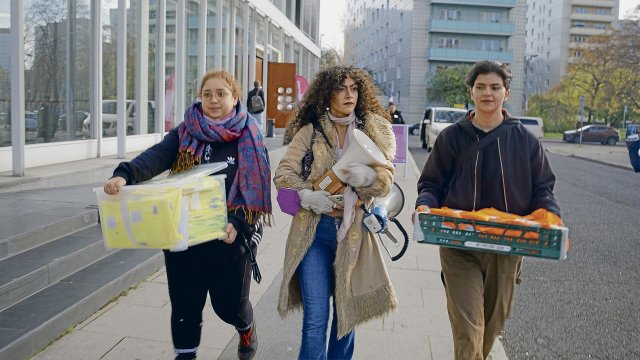You want to shout to the five young activists for 90 minutes straight about how right they are and how important their work is.
Photo: New Visions Film Distribution
In recent years, a number of films have been made about left-wing activism – most of them are shown on cinema tours in places visited by people who are also more or less within the left-wing scene. Unfortunately, these productions rarely reach a relevant, wider audience. The directors are naturally aware of this, and so these films can often be seen as encouragement or political statements that primarily have an impact on their own scene.
Therefore, on the one hand it is understandable, but on the other hand it is a bit of a shame when a film like “Never Alone, Always Together”, which opens in cinemas this Thursday, like most of its predecessor films, avoids the sensitive questions within the scene and focuses more on the Unity and the common appeal. It’s understandable because the left-wing radical scene in particular is now so marginalized, or at least thinks so, that people apparently prefer to focus on what unifies people. It’s a shame because no real positioning can be achieved this way; and the problem that there are relevant points of contention within the left that seem insurmountable to many and have paralyzed the scene for decades cannot simply be undone with “always together.”
In the film by director Joana Georgi we watch five young activists, namely the Berliners Quang, Simin, Feline, Patricia and Zaza, in their political work, but also how they cope with their everyday lives, and you want to watch them for 90 minutes constantly shouting how right they are and how important their work is. The film is an entertaining, combative contemporary document about five clever and courageous people who dream of a liberated society and have thrown themselves into the fight. No matter how marginal their scene may be, it is definitely powerful at least on certain topics and in big cities, as the film shows. One of the protagonists, Zaza, helps to unionize nursing staff, Quang is active in Fridays for Future, Patricia was able to mobilize the city’s population in Berlin with the Deutsche Wohnen & Co. expropriate initiative and achieved great political success in the process.
The film’s narrative, according to which five friends from different left-wing backgrounds and therefore with different viewpoints can only become strong through “common ground”, “together”, remains superficial – this “together” is dysfunctional because it is a dissension is not shown at all. But that’s exactly what would have been interesting: Where are the political frictions between the protagonists? What are they arguing about politically, and how does their desire for commonality and their knowledge of the need for political “together” carry them beyond the points of contention?
The film hardly provides any answers to such questions, at least only a few political ones. “Together” mainly refers to a feeling, to a certain form of friendship that goes beyond the political but is primarily private. Only once is something like a political perspective mentioned, namely by Simin, who warns that we need “an overarching organizational context like a communist party so that our movements do not diverge loosely from one another.”
What that could mean exactly, how modern communism could differentiate itself from authoritarian forms, how one wants to make such an organizational context palatable to a large part of the left-wing movements that neither see themselves as traditional communist nor want to subordinate themselves to a party structure, is something that the film and film are silent about protagonists.
“Never alone, always together” is a very entertaining and optimistic feel-good documentary about left-wing radical activism, which always has its strongest moments when it gets down to business, for example when we learn from Zaza how stressful a nursing job is: »Nursing trainee today means constant overtime, 950 euros gross, second job during training… constantly doing activities for which you are not trained, dark circles under the eyes, frustration of patients, your own frustration, frustration of your superiors. … This takes a lot out of me, and I am immensely grateful to my friends and comrades that they are there.”
Here it becomes clear how important union organizing is – and the entire sequence with Zaza and a friend painting posters and talking about their professional situation and the needs of political struggles is perhaps the most impressive sequence in the film. Here too, the mood remains good, everyone ultimately laughs away their doubts and agrees that the additional effort for political work is definitely worth it.
The question remains why radical left ideas, which are mostly radically solidarity-based, people-friendly and address the manifest problems of those who do not have large lobby groups behind them in a serious and well-founded manner, are hardly noticed in the public debate. And why, in the recent European elections, many workers, employees and even nursing staff preferred to follow the AfD’s fantasy and conspiracy narratives instead of doing something with other affected people against capitalist constraints and automatisms. Because that’s exactly what only the (radical) left offers, and they do it with passion and friendliness, that’s what the film shows first and foremost. It remains to be hoped that “Never alone, always together” will also find an audience beyond the relevant scene.
“Never alone, always together”, Germany 2024. Director: Joana Georgi. 90 min. Cinema release: June 13th.
Subscribe to the “nd”

Being left is complicated.
We keep track!
With our digital promotional subscription you can read all issues of »nd« digitally (nd.App or nd.Epaper) for little money at home or on the go.
Subscribe now!
judi bola link sbobet judi bola sbobet
